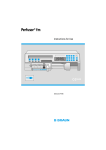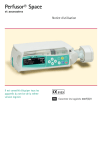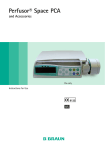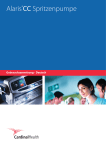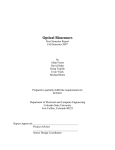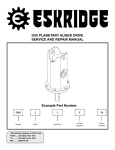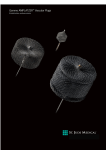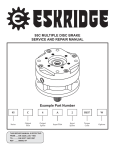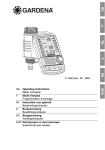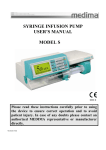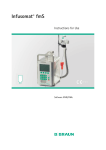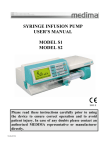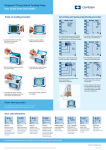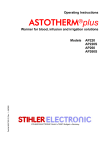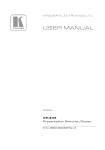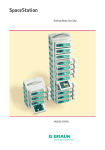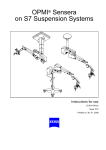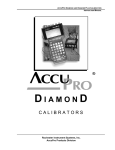Download Perfusor® compact S - Frank`s Hospital Workshop
Transcript
Perfusor® compact S Instructions for Use Software BE Patient Safety Attention: Consult accompanying documents ! Read Instructions for Use prior to use. Application only under regularly supervision by specially trained staff. Operation ➤ Ensure the unit is properly positioned and secured. ➤ Prior to use check audible and visual alarms during self test. Also check the device for possible damage. ➤ Connect to patient only after switching on the device. Interrupt the connection during syringe changes to prevent incorrect dose delivery. ➤ Select syringe/catheter suitable for use with the intended medical application. ➤ Position the infusion line free of kinks. ➤ Recommended change of disposables after 24 h (consider national hygiene regulations). ➤ Installation in medically used rooms must comply with the appropriate regulations (e.g. VDE 0100, VDE 0107 or IEC-publications). Observe national specifications and deviations. ➤ Possible explosion hazard if used in presence of flammable anaesthetics. ➤ Compare displayed value with entered value. Start infusion only if values are corresponding. ➤ Do not use the device when service indicator is displayed permanently. ➤ If staff call is used we recommend to check the equipment once after connecting the pump. ➤ Protect the device against moisture. Other components ➤ Variations in pressure (e.g. as caused by change of level) can affect the accuracy of the device. ➤ Where several infusion lines are connected on one single vascular access the possibility of their exerting a mutual influence vice-versa cannot be excluded. ➤ Refer to respective manufacturer’s information for possible incompatibilities of equipment resp. drugs. ➤ Use only compatible combinations of equipment, accessories, working parts and disposables. ➤ The use of not recommended resp. incompatible disposables may influence the technical specifications. ➤ Connected electrical equipment must comply with the relevant IEC/EN-pecifications (e.g. IEC/EN 60950 for data-processing equipment). The user/operator is responsible for the system configuration if additional equipment is connected. The international standard IEC/EN 60601-1-1 has to be taken into account. Safety Standards Perfusor® compact S satisfies all safety standards for medical electrical devices in compliance with IEC/EN 60601-1 and IEC/EN 60601-2-24. ➤ The EMC-limits (electro-magnetic compati bility) according to IEC/EN 60601-1-2 and IEC/EN 60601-2-24 are maintained. If the equipment is operated in the vicinity of other equipment which may cause high levels of interference (e.g. HF surgical equipment, nuclear spin tomography units, mobile telephones etc.) maintain the recommended protective distances for these devices. Perfusor® compact S Contents Perfusor® compact S / Overview Page 4 Operation Page 6 Special Functions Page 8 Start-up and Trumpet Curves Page 10 Alarms / Displays Page 11 Battery Operation Page 14 Compatible Syringes Page 15 Technical Data Page 19 Warranty / TSC / Service / Cleaning Page 21 Ordering Page 22 The Perfusor® compact S is according to IEC/EN 60601-1 resp. IEC/EN 60601-2-24 a transportbale infusion syringe pump for administrating fluids in nutritional therapy and infusion technique as well as for home care applications. The medical specialist must decide on suitability for application on the basis of the warranted properties and the technical data. For further details please refer to the Instructions for Use. 3 Overview Handle Always use the handle when carrying. Operation To access functions, first press the F button Display Shows all important information at a glance: rate, syringe type, power source, infusing symbol and alarm symbols (see "Alarms” on page 11). Syringe Holder Locks the syringe in place. To remove, pull and turn to the left. Instructions for Use and Syringe Table Slide-out short instructions for Use and a syringe table are attached underneath the pump. Battery Compartment Disconnect the pump from the patient while changing the battery. Switch off the device. Remove screw (1), press in the green tab (2) and slide compartment door down. Always change all batteries. Taking care to observe waste disposal regulations (see also page 21). 4 Locking Lever To move the drive unit manually, push the locking lever up until it clicks. Syringe Adapter Multi-Function Connector (MFC) Connection for staff call, ambulance (12 V) and interface. (1) (2) Mains Connection Connection for the power supply. In the event of power failure, the pump automatically switches to battery power. Clear data Alarm silence for 2 min. ON/OFF. Press for 2 sec. to turn off. Start/Stop Infusion Special Functions / Function key First press F to access the special functions of the pump (= Select / Enter key). Decimal point Alarm indicator Transport A maximum of three devices may be connected together. Special care is required here if a patient is already connected. Avoid external mechanical influence! Locking Devices Together Place one device on top of the other. Push connecting rod of top pump down into the slot of the pump below until it clicks into place. To lock, turn the "key” until it is vertical. To disconnect, turn the "key” until it is horizontal. Push the white key in and slide up. Pole Clamp Attach the Perfusor® compact S from above, clicking it into place. To release, press the black button and lift the pump from the clamp. For safety purposes attach each device separately to the IV pole. A rotating pole clamp can be used for a vertical fixation of the Perfusor® compact S, as available. 5 Operation Infusion 1. Insert Syringe ➤ Switch on using . Note the automatic self-check: All display elements will appear for approx. 2 seconds and the audible alarm will sound. - Then the rate display shows: 111.1 222.2 555.5 - Then the software version: BE. In addition, the , CC, and decimal point will blink. ➤ Open the syringe holder, slide the locking lever up and extend the drive unit. Align the primed syringe so the flange is positioned in the syringe grip plate, and the top of the plunger is positioned in the syringe pressure plate. Press the syringe in. The locking lever should snap back on its own. Close the syringe holder. The syringe code displayed must match that of the syringe inserted. (Ref. to the guides attached underneath the pump. If the code does not match the syringe type inserted, see Syringe Tables/-Compatibilities, page 16 ff). ➤ If syringe type code is correct, press F. ➤ Prime the line by using the BOL-key. (Prime rate = adjusted bolus rate.) Press F, then BOL once. The bolus rate will blink. Press and hold BOL key again until the line is primed (max. 1 ml respectively for 10 seconds can be delivered). If applicable, repeat priming with BOL key. (During STOP, the infused bolus volume is not added to TOTAL volume.) 2. Setting the Rate ➤ Enter between 0.01 and 200.0 ml/h1) (e.g. enter 2,56 ml/h press 2 - . – 5 – 6). Check display. To correct: Press C and enter the new rate. 1) 2) 6 Here only insert a 50 ml Original Perfusor Syringe (OPS). Syringe grip plate insert here (all syringes except OPS 50 ml) Movable Drive Mechanism 2) Syringe Holder Syringe grip plate Locking Lever 2) Syringe Pressure Plate 2) insert here 3. Start the Infusion ➤ Press START. Rotating infusion symbol is displayed. 4. Stop the Infusion ➤ Press STOP or for 2 seconds. Disconnect from the patient. ➤ Open the syringe holder. Remove the syringe. ➤ To switch off, press for 2 seconds. To Change Syringes ➤ Press STOP. Disconnect from the patient! See Technical Data If syringe is out of alignment at the grip plate and the pressure plate, free flow cannot be excluded. Do not carry the device during operation by the movable drive mechanism. ➤ Open syringe holder and remove the syringe. Insert a new primed syringe with primed tubing. ➤ Close syringe holder. ➤ Confirm the type of syringe by pressing F. ➤ Connect to patient and press START. To change the rate ➤ Press STOP. ➤ Press C and enter the new rate. ➤ Press START. To Change the Rate Without Interrupting the Infusion (Titration) While the infusion is in process: simply press C and enter new rate, then confirm by pressing F. The new rate now applies. (If F is not pressed after making the rate change, the display will revert to the previous rate after 10 seconds.) 7 Special Functions ➤ Activate the special functions by pressing the F button (F is shown in the display). ➤ During infusion, only statuses can be checked. Excluding rate titration and data lock, changes in values can be made only when the pump is stopped. ➤ Use the F button to confirm input values or to exit the function. ➤ If a set value is higher than the possible limit, the max. possible value is shown, an alarm will sound. The value can be accepted by pressing the F button. After the device is switched off, all values are cleared. Syringe Selection Open the syringe holder, press the syringe code blinks. Press C, enter a new syringe code and confirm by pressing F. Close syringe holder and start infusion. Double-check the new syringe code while infusion is taking place by pressing F and . Bolus To alter the bolus rate (only when device is stopped): Press F, then BOL. The bolus rate will blink. Press C, set new bolus rate and confirm with F. If bolus rate is set to zero, the bolus and prime function is switched off. (Bolus and prime rate are identical). Bolus applications during infusion Option A: Bolus with pre-selected volume Press BOL. The bolus rate will blink. Press C, set volume (in 0.1 ml steps) and confirm with F. The bolus volume infused will be displayed (max. value corresponds to the syringe size in use). Press any key to stop bolus infusion. Option B: Bolus on demand Press BOL once, bolus rate is blinking, then press and hold BOL again as long as bolus administration is required (max. bolus allowed is 10 % of syringe size or 10 seconds). An audible signal will be given for each ml delivered. Take care not to overdose! Given a bolus rate of 800 ml/h, e.g. 0.1 ml will be reached in just 0.45 seconds. During bolus no 8 syringe pre-/end alarm is given. Standby Press F, then STANDBY. and F are displayed, and the infusion is paused indefinitely. Set values are retained. Pressing F again cancels the Standby. Total Volume Infused Shows the volume already infused. If this exceeds 999.9 ml this max. value blinks. To clear the total to 0.0 ml, press C or switch device off. Volume To Be Delivered (VTBD) Press F, then and enter the volume to be delivered, confirm value with F. After VTBD has been set -symbol flashes. During infusion, VTBD counts down. Infusion automatically stops when VTBD is reached. Clear VTBD: Press F, then and press C. The display shows: ---.- (for unlimited infusion). Press F to accept or enter new VTBD. Note: Clearing VTBD also clears the Time Limitation. Check remaining VTBD during infusion: Press F and . The remaining amount of VTBD is displayed. Note: Bolus infusions influence the VTBD. If a rate and VTBD are set, the remaining time of infusion is automatically calculated and can be checked during operation (press F and as well as in STOP mode. Time Limitation Press F, then and enter the required time limitation, confirm value with F. After a time has been set the -symbol flashes. During infusion, the time counts down. Infusion automatically stops after the time has been reached. Clear time: Press F, then and press C. The display shows: --:-- (for unlimited infusion). Press F to accept or enter new time. Note: Clearing the time also clears the VTBD. Check remaining time during infusion: Press F and The remaining infusion time is displayed. Note: If a rate and time are set, the remaining VTBD is automatically calculated and can be checked during operation (press F and ) as well as in STOP mode. Bolus applications and rate changes also will change the time value, based on the remaining VTBD and the set rate. Volume Over Time (automatic calculation of the rate): Set rate to zero. Set VTBD and time values (see descriptions above). After both values have been confirmed by pressing F, the calculated infusion rate is blinking in the display. Start infusion with START/STOP key. Note: A change of the rate also will change the time value, based on the new rate and the remaining VTBD. If the calculated rate is cleared, the time is cleared automatically, but not the remaining VTBD. VTBD only will be cleared after a new time has been set and the rate has been set to zero. Data Lock When e.g. rate and VTBD or time are set, press and hold F key; also press data lock key at the same time. Now all pump data are locked and the display alternately shows LOC and the current rate. Press START/STOP key to start the infusion. Note: When data lock is active, no values can be changed and the bolus function is switched off. It is only possible to stop or to start the device. To deactivate data lock: Press and hold F key and also press data lock key at the same time. Note: Data lock may be activated and deactivated in either STOP Mode or while infusion. Battery Capacity Shows the remaining capacity of the battery: low, medium, high. The LCD shows: "000b" when using standard batteries. "xxxA", ” when using rechargeable batteries. "xxx" = capacity in mAh. To change Occlusion Sensitivity In case of an occlusion the device goes into alarm. As lower the pressure setting as faster the time to occlusion alarm. Press F, then Press 1 (low), 2 (medium) or 3 (high), then press F to confirm settings. During an occlusion alarm, the bolus volume built up by the pump is automatically reduced. 9 Start-up and Trumpet Curves The graphs show the accuracy/uniformity of flow in relation to time. Allow for the following: The delivery behaviour or delivery precision is essentially influenced by the types of (disposable) syringe used. Significant deviations may be encountered if use is made of (disposable) syringes other than those stated in the order data. 10 Trumpet Curves Measured values for second and last hour in each case. Measurement interval ∆t = 0.5 min Observation interval p x ∆t [min] Start-up Curves Measurement interval Measurement duration Flow Qi ∆t = 0.5 min T = 120 min (ml/h) Alarms / Displays ➤ During an alarm the -symbol, and one or more of the following symbols will blink. Device alarm Symbol / Cause Correction Display message e.g. "071” and permanent audible alarm signal. Unit defective, internal device failure. Press and hold ON/OFF key for at least 3 seconds until the alarm symbol in the display is extinguished. Then release the key and switch on the device again. If the unit defective alarm appears again, take the device to service. Operation alarm Symbol / Cause Correction Battery flat, battery near flat warning begins 30 min before the battery is dead. Connect to mains and/or replace the alkaline batteries. Pressure alarm e.g. because of an occlusion. Fluid is unable to be infused. Bolus reduction is automatically initiated by the pump. Check for kinks in tubing, IV patency and filter patency. Increase occlusion pressure if necessary. Check if syringe is empty. Due to varying syringe tolerances, a pressure alarm may occur when the syringe is empty prior to end of infusion alarm. Syringe near empty. Alarm will sound 3 min before syringe is empty (only black syringe field is blinking) resp. end of infusion. Prepare to end infusion or to begin next infusion. Due to syringe tolerances, some fluid may be left in the syringe when pump goes into "end of infusion alarm”. At "end of infusion alarm”, the pump goes into an audible alarm dependent on the adjustment in the service menue. If some fluid is left in the syringe after "end of infusion alarm” appears, the pump continues to deliver until pressure alarm appears. Reminder: Data input has not been entered within 2 min, also pre-alarms are indicated via this symbol. Enter data where indicated. 11 Alarms / Displays Device alarm Symbol / Cause Correction Top of the plunger is improperly positioned in the syringe pressure plate Ensure top of syringe plunger is securely positioned in the syringe pressure plate. Operation alarm Symbol / Cause Correction + Automatic bolus reduction has been interrupted. Bolus has to be reduced manually. Reduce bolus by disconnecting the infusion line from the patient and open the locking lever. Locking lever at the drive head has not clicked into place. Ensure plunger head is securely positioned in the syringe pressure plate and the locking lever has engaged. Preset VTBD and/or TIME have been reached. Clear VTBD or TIME for unlimited infusion or set new values. Alarm silence: Interrupts the alarm for a period of 2 min. Syringe holder not closed. Rate has not been set prior to start. 12 Set rate required prior to START. Displays Special function is active Mains / AC power operation VTBD and/or TIME have been entered. + Service indicator blinks when the service interval has elapsed. Infusion control: Rotates to show an infusion in progress. 13 Battery Operation General Information The Perfusor® compact S is equipped with four AA non-rechargeable standard batteries (alkalimanganese). Alternatively, a rechargeable NiCd-battery pack from B. Braun can be used. This battery pack is charged by the device during connection to mains. To ensure safe and reliable battery operation, certain rules of application must be noted: ➤ The battery indicator display is a trend display (low, medium, high). ➤ The actual battery life available may vary due to • different battery manufacturers • temperature • varying load (e.g. frequent boluses). ➤ Batteries can explode or leak causing damage if • they are opened or burned, • they are inserted incorrectly, • old and new batteries are inserted together or • different brands of batteries are inserted together. ➤ Batteries should be removed from the device during long periods of non-use (storage > 3 months). If the batteries are removed from the device while infusing and subsequently a new battery set is put in, the Perfusor® compact S goes into alarm (message: "022” is displayed in combination with the alarm symbol). This is a safety precaution, as the electric safety system suspects a defect in the battery compartment (e.g. loose contact or corroded contacts). In order to switch off the alarm, press and hold ON/OFF key for at least 3 seconds until the alarm symbol in the display is extinguished. Release the key. Then again switch on the device in battery mode. 14 ➤ Batteries should be replaced when a "battery flat” alarm occurs during frequent boluses, or after 2 years, even if the battery capacity display indicates "full”. ➤ During the automatic self-check, the pump determines if the internal energy supply is capable of sounding a power-failure alarm. If the energy source is exhausted, an alarm is produced. In this case, the operator may only use the device under constant supervision, since a power failure would remain undetected by the device. ➤ Only alkali-manganese batteries may be placed in the battery compartment because • Alkali-manganese batteries recommended are free of mercury and cadmium. • Conventional carbon-cell batteries give an incorrect reading on the capacity display and therefore, cannot guarantee reliable operation. • NiCd rechargeable batteries must not be connected to the battery contacts as their various physical properties disrupt the alarm. Attention: After exchange of non-rechargeable batteries, the device has to be switched on once in the battery mode. The capacity now is detected during the self-check; the battery symbol in the display displays the actual capacity. If the Perfusor® compact S is switched on after being connected to AC power, the symbol "battery flat” blinks despite having "full” batteries. Operating Times with Standard and Rechargeable Batteries at max. pressure level Compatible Syringes The syringe types listed in the following tables can be used with the Perfusor® compact S. The tables include the Code Number1) of syringe brands which can be selected via the syringe selection key (see page 8). Please reference the tables below for specific syringe brand compatibility (e.g. Cat. Nos2)). Note also additional information is provided regarding syringe "near empty” warning for each syringe size. The table shows the minimum filling volume (Min. Vol.3)) and the maximum delivery rate (Max. Rate4)) requirements to guarantee 3 minute syringe "near empty” warning (pre syringe alarm). The bolus volumes (Bolus Vol. 5)) have been measured in the lowest and highest pressure settings (P1/P3) after the automatic reduction of the post occlusion bolus. The Times to Occlusion6) alarm have been measured at 5.0 ml/h. The measured data are typical average values which can vary because of possible syringe tolerances. 15 Compatible Syringes Manufacturer: B. Braun Omnifix Omnifix Omnifix Omnifix Omnifix Omnifix Syringe Type 2 ml 5 ml 10 ml 20 ml 30 ml 50 ml B. Braun 1) 2 5 10 22 30 52 Code No 2) 461 7029 461 7053 461 7100 461 7207 461 7304 461 7509 Cat. No. 3) 0.5 1.2 2.1 5.3 5.9 7.2 Min. Vol. [ml] 4) 7.0 19.2 32.0 93.4 97.9 117.0 Max. Rate [ml/h] 5) typ. typ. typ. typ. typ. typ. Bolusvolumina 0.058 0.057 0.128 0.123 0.225 P1 [ml] 0.032 0.096 0.173 0.233 0.272 0.264 P3 [ml] 0.079 6) typ. typ. typ. typ. typ. typ. Time to Occl. 01:01 01:03 02:26 02:49 06:25 P1 [mm:ss] 00:38 02:00 03:29 05:23 08:20 18:13 P3 [mm:ss] 01:36 Manufacturer: B. Braun Syringe Type OPS OPS B. Braun 20 ml 50 ml 1) Code No 20 50 2) Cat. No. 872 8615 872 8810 3) Min. Vol. [ml] 4.4 9.6 4) Max. Rate [ml/h] 78.5 164.4 5) Bolusvolumina typ. typ. P1 [ml] 0.119 0.305 P3 [ml] 0.218 0.369 6) Time to Occl. typ. typ. P1 [mm:ss] 02:18 06:25 P3 [mm:ss] 04:21 18:13 16 Proinjekt 50 ml 51 872 8917 7.1 127.0 typ. 0.290 0.329 typ. 04:18 17:58 Manufacturer: TYCO EU Syringe Type TYCO EU Code No1) Cat. No. 2) Min. Vol..3) [ml] 4) Max. Rate [ml/h] 5) Bolusvolumina P1 [ml] P3 [ml] 6) Time to Occl. P1 [mm:ss] P3 [mm:ss] Monoject Monoject Monoject Monoject Monoject Monoject 3 ml 6 ml 12 ml 20 ml 35 ml 50/60 ml *) 3.4 5.4 16 29 39 55 110011001100110011001100635430 650090 603495 606159 612173 620036 8.33 8.54 1.10 1.16 2.51 3.36 144.8 143.2 13.6 16.9 40.5 51.2 typ. typ. typ. typ. typ. typ. 0.371 0.504 0.023 0.027 0.107 0.212 0.465 0.376 0.050 0.053 0.199 0.332 typ. typ. typ. typ. typ. typ. 07:55 10:57 01:04 00:46 02:13 04:07 13:30 14:12 01:47 01:34 04:16 07:21 Manufacturer: TYCO USA Syringe Type TYCO USA Code No 1) Cat. No. 2) Min. Vol..3) [ml] 4) Max. Rate [ml/h] 5) Bolusvolumina P1 [ml] P3 [ml] 6) Time to Occl. P1 [mm:ss] P3 [mm:ss] Monoject Monoject Monoject Monoject 6 ml 12 ml 20 ml 35 ml 5.2 15 26 35 8881888188818881716008 512878 520657 535762 1.2 2.7 5.5 8.5 16.0 42.5 93.0 145.0 typ. typ. typ. typ. 0.019 0.029 0.064 0.123 0.068 0.101 0.129 0.360 typ. typ. typ. typ. 00:44 01:50 02:30 04:30 02:20 05:20 07:20 16:00 Monoject 50/60 ml 62 8881560125 8.6 144.0 typ. 0.078 0.185 typ. 04:22 15:56 *) To use only with a special syringe adapter (Cat. No. 34506659). This adapter also is usable for all further syringe types (exchange via service, see page 4) 17 Compatible Syringes Manufacturer: Terumo Syringe Type Terumo Code No1) Cat. No. 2) Min. Vol.3) [ml] 4) Max. Rate [ml/h] Bolusvolumina5) P1 [ml] P3 [ml] 6) Time to Occl. P1 [mm:ss] P3 [mm:ss] 3 ml 3.1 SS*03L 0.7 12.1 typ. 0.009 0.031 typ. 00:52 01:43 5 ml 5.1 SS*05L 1.3 23.3 typ. 0.012 0.066 typ. 00:35 02:16 10 ml 13 SS*10L 1.7 22.0 typ. 0.051 0.050 typ. 01:44 03:02 20 ml 23 SS*20L 3.8 69.7 typ. 0.019 0.052 typ. 01:04 04:08 30 ml 32 SS*30L 4.3 77.6 typ. 0.081 0.196 typ. 02:57 09:48 50 ml 54 BS-50LG 5.1 89.6 typ. 0.114 0.137 typ. 05:44 15:19 Manufacturer: Becton Dickinson Syringe Type B-D Code No 1) Cat. No2) Min. Vol.3) [ml] 4) Max. Rate [ml/h] Bolusvolumina5) P1 [ml] P3 [ml] 6) Time to Occl. P1 [mm:ss] P3 [mm:ss] 18 Plastipak Plastipak Plastipak Plastipak Plastipak 3 ml 5 ml 10 ml 20 ml 30 ml 3.3 5.3 11 24 31 309585 309603 309604 309661 309662 300910 300911 300912 300913 300863 300134 309650 300629 0.7 1.3 2.0 4.7 6.0 10.4 21.0 34.5 93.4 72.9 typ. typ. typ. typ. typ. 0.008 0.038 0.028 0.031 0.108 0.038 0.059 0.079 0.134 0.138 typ. typ. typ. typ. typ. 00:12 00:56 00:29 00:38 00:53 00:31 01:26 01:26 04:05 04:51 Plastipak 50/60 ml 61 309663 300865 300869 8.0 133.2 typ. 0.156 0.293 typ. 04:19 12:50 60 ml 60 SS*60L 5.2 90.7 typ. 0.038 0.135 typ. 02:19 12:55 Technical Data Type of unit Infusion Syringe Pump Classification (acc. to IEC/EN 60601-1) defibrillator-proof; CF equipment Protection class II Class (acc. to Directive 93/42 EEC) II b Moisture protection IP 22 (drip protected for horizontal usage) Power supply integrated: • Rated voltage • Power input 220/240 V, 50/60 Hz, AC ~ or 110/120 V, 50/60 Hz, AC ~ 12 VA External extra-low voltage 12 V Staff call Max. 24 V / 1 A / 24 VA Arbitrary connection polarity (VDE 0834) EMC EN 55011 IEC/EN60601-1-2 and IEC/EN 6360601-2-24 Time of operation 100 % (continuous operation) Operating conditions • Relative humidity • Temperature • Atmospheric pressure 30 % ... 90 % (without condensation) + 5 °C ... + 40 °C 500 mbar ... 1060 mbar Storage conditions • Relative humidity • Temperature • Atmospheric pressure 30 % ... 90 % - 20 °C ... + 55 °C 500 mbar ... 1060 mbar Battery type (non-rechargeable) 4 x 1.5 V DC alkali manganese Operating life of battery > 60 h at ≤ 10 ml/h Type of Battery pack (rechargeable) NiCd (optional 0.6 Ah) Operating time of rech. battery > 10 h at ≤ 10 ml/h Recharging time > 16 h Weight Approx. 1.6 kg Dimensions (WxHxD) 190 x 100 x 120 mm DC (e.g. ambulance cars) 19 Technical Data Selectable delivery rates Continuous infusion rate range / bolus rates in dependence on syringe sizes: Syringe sizes [ml] 50/60 bolus rates [ml/h] 1 – 1.200 20/30 5/10 2/3 1 - 700/800 1 - 150/200 1 - 70 cont. rates [ml/h] 0.01 – 99.99 100.00 – 200.00 0.01 – 99.99 0.01 – 50.00 0.01 – 25.00 Volume pre-selecetion / VTBD 0.1 – 999.9 ml Time pre-selecetion 00:01 – 99:00 h Techn. Accuracy excl. syringe tolerance ± 0.2 % Accuracy of set delivery rate: typ. ± 2,5 % (measuring time >1 h and infused volume >2 ml) Occlusion alarm pressure (occlusion sensitivity) 3 settings: Alarm in the event of incorrect dosage a) Malfunctions of the device For incorrect dosages of > 0.015 ml due to malfunctions of the device the pump automatically switches off. step 1: approx. 0.3 bar step 2: approx. 0.6 bar step 3: approx. 1.2 bar b) At occlusion typ. 1 ml bolus volume at highest compression phase with 50 ml OPS = max. alarm delay at 5 ml/h = 6:50 min. Compatible Syringes Customer-specific syringe configuration: list of syringe types see page 16 ff. Adjustable syringe codes Syringe codes see page 16 ff., enclosed labels have to be attached underneath the pump. Computer connection RRS 232 in combination with B. Braun interface lead (871 1661) including electrical separation. Interface description on request. Pay attention to safety notices. Technical inspection (safety check) Every 2 years 20 Warranty / TSC*) / Service / Cleaning Responsibility of the Manufacturer Technical Safety Check *) / Service The manufacturer, assembler, installer or importer considers himself responsible for the effects on safety, reliability and performance of the equipment only if: The Technical Safety Check is recommended to be carried out every 2 years and should be documented. • assembly operations, extensions, re-adjustments, modifications or repairs are carried out by persons authorised by him, • the electrical installation of the relevant room complies with the appropriate requirements (e.g. VDE 0100, 0107 and/or the IEC-publications resp. national requirements), • the equipment is used in accordance with the Instructions for Use and • the Technical Safety Checks are carried out regularly. The CE mark confirms that this medical product complies with the "Council Directive on Medical Devices 93/42/EEC” dated 14th June 1993. B. Braun Melsungen AG Service work must be carried out exclusively by personnel instructed by B. Braun. Cleaning Clean using mild soap suds. Do not use spray disinfectant at the mains connection. Recommended: disinfectant for wiping available from B. Braun (e.g. Meliseptol®). Before operation the device allow to air for at least 1 min. Do not spray into openings in the device. Be sure to observe the instructions provided concerning waste disposal and hygiene for batteries and disposables. Check regularly Check for cleanliness, completeness and damage. Use only according to Instructions for Use. Check when switching on: self-check, audible alarm, process- and alarm control indication. Check battery contacts for corrosion and clean with smooth rubber once year. Warranty B. Braun provides 24 months warranty, as from the date of delivery, for every Perfusor® compact S. This covers repair or replacement of parts damaged as a result of design/ manufacturing errors or material defects. Modifications or repairs to the unit undertaken by the owner or by third parties invalidate the warranty. Despite careful packaging, the risk of transport damage cannot be entirely prevented. Upon delivery, please check that nothing is missing. Do not use a damaged device! Contact the service department. The warranty does not cover the following: Elimination of faults attributable to incorrect/inexpert handling, or to normal wear and tear incl. primary batteries and rechargeable batteries. Perfusor® compact S, Power Cord, Pole Clamp, (Short Instructions for Use and syringe tables in separate packaging), 4 primary batteries. Inspection on Delivery Items included 21 Ordering Art. No. Perfusor® compact S (230/240 V) Perfusor® compact S (110/120 V) Recommended accessories for the Perfusor® compact S Connecting lead for staff call Connecting lead for ambulance car (12 V) Interface lead with electrical insulation Rechargeable battery pack Y-lead for central mains power supply for 2 Perfusors Original Perfusor Syringes Original Perfusor Syringe 50 ml with draw-off cannula Original Perfusor Syringe 50 ml without draw-off cannula Original Perfusor Syringe 50 ml with draw-off cannula and particle filter, with light protection Original Perfusor Syringe 50 ml with draw-off cannula and particle filter Original Perfusor Syringe 20 ml with draw-off cannula Original Perfusor Syringee 20 ml without draw-off cannula Original Perfusor Syringe 20 ml with draw-off cannula and particle filter Omnifix Syringe 50 ml Luer-Lock Omnifix Syringe 30 ml Luer-Lock Omnifix Syringe 20 ml Luer-Lock Solo Omnifix Syringe 10 ml Luer-Lock Solo Omnifix Syringe 5 ml Luer-Lock Omnifix Syringe 2 ml Luer-Lock Solo 22 871 4843 871 4886 871 1682 871 1674 871 1661 3450 1690 870 0109 872 8810F 872 8844F 872 8828F 872 8852F 872 8623 872 8615 872 8631 461 7509 461 7304 461 7207 461 7100 461 7053 461 7029 Art. No. Original Perfusor Tubings Original Perfusor Tubing N, made of PVC, with Luer lock connectors; 150 cm Original Perfusor Tubing L, made of PVC, with Luer lock connectors; 200 cm Original Perfusor Tubing MR, made of PVC, with Luer lock connectors; 75 cm Original Perfusor Tubing M, made of PVC, with loose lock nut on patient end, 150 cm Original Perfusor Tubing PE, made of PE, with Luer lock connectors, 150 cm Original Perfusor Tubing S, made of PVC, light-protected, with Luer lock connectors, 150 cm Original Perfusor Tubing PES, made of PE, light-protected, with Luer lock connectors, pressure-resistant, 150 cm Original Perfusor Tubing MK, made of PVC, with cannula and Luer lock connectors, 75 cm Original Perfusor Tubing, made of PVC, with sterile filter 0.22 µ, with Luer lock connectors, 200 cm (not for use together with 20 ml syringes) 872 2960 872 2862 872 2870 872 2994 872 2935 872 2919 872 3010 872 2889 872 3001 23 HOSPITAL CARE B. Braun Melsungen AG PO box 11 20 D-34209 Melsungen Material-No. 3891 4280, Drawing No. M654010201F04/a 3/00 Printed on pulp bleached 100 % chlorine-free Tel. +49(0)56 61-71 -0 Fax +49(0)56 61-71 -20 44

























